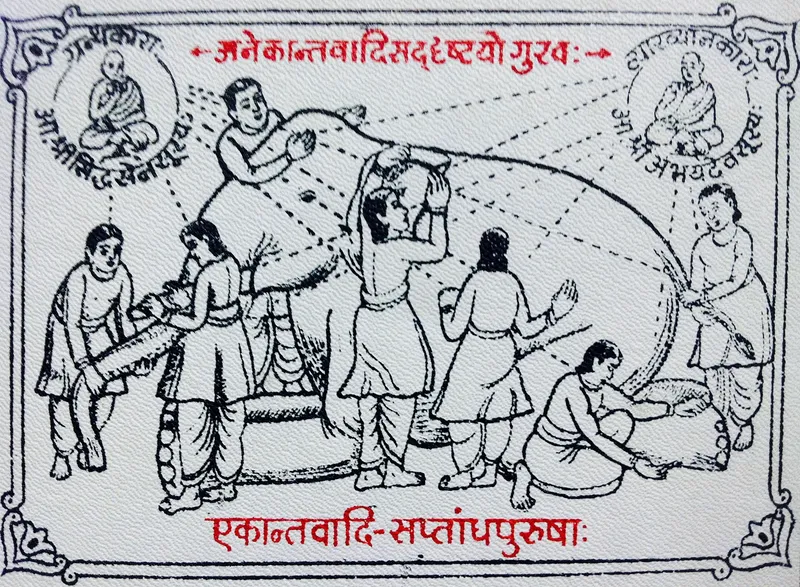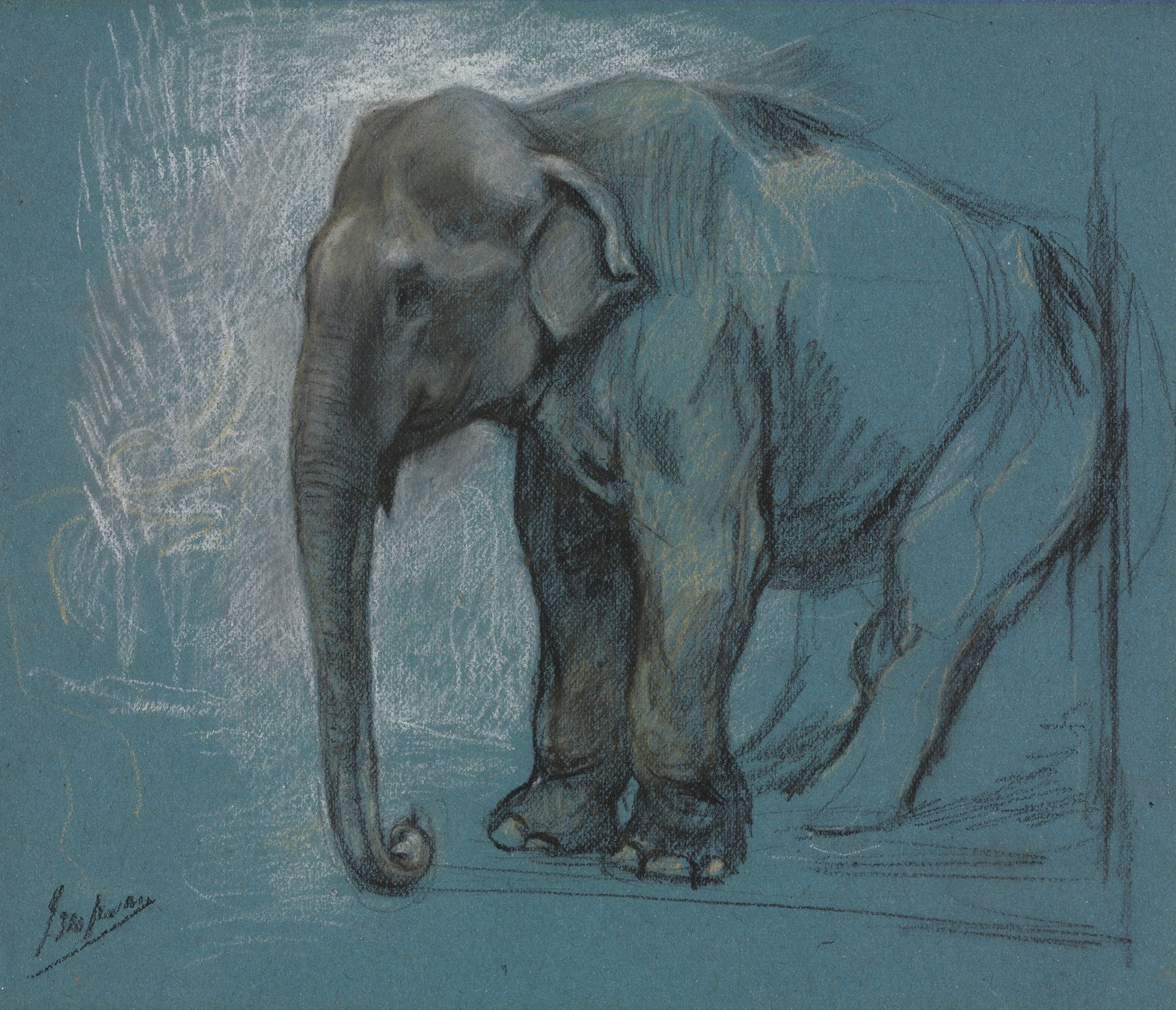Year One
On trying to be "The Invisible Elephant Guy" after one year of Aether Mug
Marco Giancotti,

Marco Giancotti,
Cover image:
Study of an Elephant, John Macallan Swan
One year ago this week, a quiet, LED-laden server in a cool data center not too far from you blinked and started serving my very first blog post, "Designing for Emergence," to the internet. And thus, Aether Mug was born. *cue the kazoos*
Three hundred sixty-five days and forty-seven blog posts later, it's as good a time as any to do a little retrospective. No one asked for it. I could just keep it in my private notes, to return to for comfort during the cold, hard days of Year Two. Instead, I put it up on this page. Ah!
The Practical
I realize now that I should have started blogging earlier. What was I waiting for? I was already publishing essays on Plankton Valhalla since 2022, of course, but AeMug is a very different beast. Its weekly cadence is a harsh constraint for me, because I'm a slow writer, and this work tends to consume time meant for other projects. But it also pushes me to places I might never have gone otherwise. Writing catalyzes thought, so faster writing helps me triage and clarify my vague ideas very quickly.
What they say is also true: posting more frequently does help attract more attention (more on this below). As straining as it can sometimes be, I'm glad I got on this train, and I plan to keep going. It was a good idea. Now I understand what Faulkner meant when he said, "I write when I’m inspired, and I see to it that I’m inspired at nine o’clock every morning." It's something that any journalist knows very well, but it took me time to grasp.
The Philosophical
There is a popular verse from the Bhagavad Gita, an ancient Hindu scripture, where Krishna says:
You have the right to work, but never to the fruit of the work. You should never engage in action for the sake of reward, nor should you long for inaction.
Now, I am neither Hindu nor a scholar of Hindu theology. The first time I read this, it didn't make any sense to me. Why would I work if not for the fruits of my labor? Then I started Aether Mug, and suddenly it clicked.
Here's how I interpret it in the context of writing: write what you think you should be writing. No—write what you think someone should be writing. The act of weaving sentences and clicking "publish" is the fruit. At that point, you're ready to start writing the next thing. What happens once your text is out in the wilderness is none of your business.
This mindset is a surprising source of joy for me, because it frees me to do my best work, to focus entirely on how well I'm doing it, by my own standards, without getting caught up with the kind of nitpicking some abstract omni-present reader out there might come up with. I mean, of course there is someone, somewhere, who can find fault in anything you or I do. That's their job, so let them do it in peace. Our job as writers is hard enough without those worries.
Although this Gita wisdom does help weather any backlash, it's not merely a coping mechanism. I've found that it helps with the positive response to my writing, too. When a post I wrote happens to hit a network effect surge and gets a lot of welcoming attention, the temptation to bask in the praise and ego-surf is strong. I made this mistake at first, and regretted it. Sure, you get a warm fuzzy feeling out of it, but not in a way that helps you do better next time. Quite the contrary. I've since made it a point not to read any of the online discussions about Aether Mug.
(I'm making it sound like I'm so popular and everyone is talking about me—I am not, and no one is; the buzz only happened a couple of times, and to a limited degree. The problem exists nonetheless.)
There is one exception, though. When readers write to me directly with feedback of any kind, I'm very happy to read and respond. Knowing that there is someone willing to engage in a direct conversation about what one writes is all the external reward a writer needs, in my opinion.
The Pig-Headed
I deeply respect those bloggers who make a name for themselves with very specific areas of expertise (when they actually have that expertise). Almost every successful blog seems to be like this: you have the "habit guy," the "life-hack gal," the "timely business insights blog," and so on. They know specific things and spend a lot of time researching and thinking about those specific things, and people go to them and trust them on those. It's an effective approach, it's easy on the readers, and it's excellent for SEO. The internet loves that kind of blog, and for good reasons.
I'm happily going in the opposite direction. I write about all kinds of very disparate things: systems, thinking tools, language, project management, evolution, literature, life, Life, blimps, and mental imagery, just to name a few. Needless to say, this does not make finding long-term readers easy. Some people are attracted to certain topics and not to others. I have no well-defined niche that people can find with a search keyword, and it's not very clear who is the ideal person to recommend Aether Mug to.
I don't think it would be hard to pivot to being "a blog about XYZ." The easiest way is to see where I get the strongest response and the biggest increase in subscribers, and keep writing every week on that same topic.
For example, when my post titled The Beautiful Dissociation of the Japanese Language floated to the front page of Hacker News (a forum popular among software developers), I got a big influx of new subscribers. Suddenly, more than half of my readers were people who knew me only as "a guy who has written something interesting about kanji." That was a clear opportunity: I like Japanese, I like thinking about the hidden quirks of its scripts, therefore I could just make this a Japanese Quirks blog. Tap into the network effects. This is a sound strategy, and I readily recommend it to any blogger who finds it attractive.
The thing is, it is not attractive to me. Although I love writing about Japanese, it is not because it's Japanese. I love something buried beneath the surface, some connection I sense with other important aspects of life and knowledge, and Japanese is only a manifestation of that unnamed thing. My interests have always been multidisciplinary, and it's precisely that multidisciplinarity—the messiness—that I'm interested in.

There is a famous parable of a group of blind men who meet an elephant for the first time. Each man touches a different part of the animal—one touches an ear, one the trunk, one a tusk, and so on—and each forms a very different conception of what an elephant is based on that. I see AeMug as a blog focused on an invisible elephant, and each post is a probe on some corner of that elephant. They all seem very unlike each other at first, but they are really all about the same thing.
If I've disappointed some readers by not writing more about Japanese, or about any other previous topic they've subscribed for, I'm sorry. But I don't think there is a need to sweat it too much as a blogger. For most people, it's very easy to skip reading a new post that doesn't seem to scratch a personal itch. Readers are magnanimous.
One day, I'll be so good at writing that I'll be able to encapsulate that unnamed central topic into a single blog post. Until then, I keep feeling my way around.
When all is said and done, a blog is a way to connect with other people, like any other form of communication. The important requirement is that one makes connections that feel true and natural to them—to the author. In my case, the things I want to communicate are better expressed through gradually-researched and slowly-crafted prose than through impromptu conversations. I need time to think and digest ideas big and small. There is an elephant there, I have no doubt about it, though I don't see it clearly yet. I write on this site because it is a great joy to uncover that majestic beast, together with people patient and curious enough to stick around despite, or even for the mess. ●
Cover image:
Study of an Elephant, John Macallan Swan
